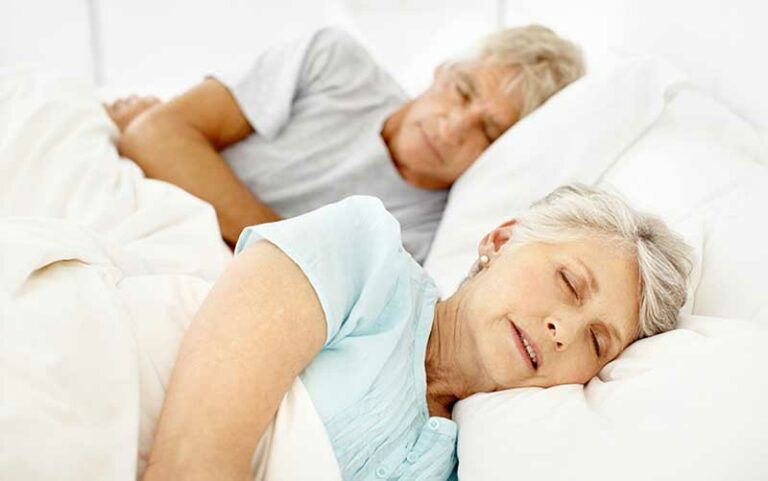We experience normal sleeping changes as we age, such as becoming sleepy earlier, waking up earlier or experiencing less deep sleep. With that said, it’s not normal to deal with disturbed sleep, waking up tired every day, and having other symptoms of insomnia as part of ageing. No matter the age, sleep is vital to your physical and emotional health.
Generally speaking, a good night’s rest helps improve concentration and memory formation while allowing your body to repair any cell damage that occurred during the day. Plus, it refreshes your immune system, which in turn helps to prevent disease.
Older adults who don’t get enough sleep are more likely to suffer from depression, attention and memory problems, excessive daytime sleepiness, and experience more nighttime falls. In addition, insufficient sleep can lead to a number of health problems, including an increased risk of cardiovascular disease, diabetes, weight problems, and breast cancer (for women).
Understanding the underlying causes of your sleep problems will help you improve your sleep quality. You can get a good night’s rest, identify and overcome age-related sleep problems, and improve the quality of your waking with our ’10 Sleep tips for seniors’.
Sleep Tips For Older People – 10 Useful Tricks
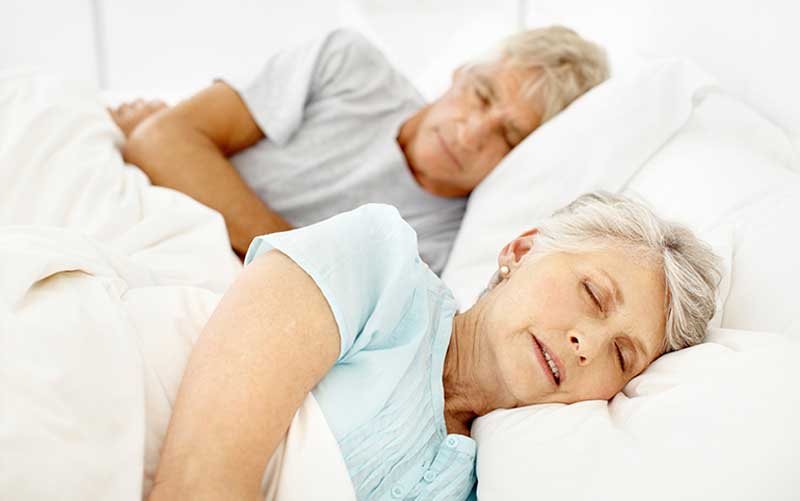
According to research, older people can improve their sleep by taking a few steps. Developing habits that encourage quality sleep and improving sleep hygiene are some of the steps involved. There are a few ways to get a better night’s rest in your golden years. They are the following:
- Have a bedtime routine and good sleep hygiene – Having a routine is a constant that will help prepare your mind and body for bed. Following a relaxing pre-bed routine and building healthy habits for a good night’s sleep is essential. In addition, by having good sleep hygiene, you improve your productivity and overall quality of life.
- Keeping a regular sleep schedule – If you want to get your peace and quiet, you have to keep a strict sleep schedule. Ageing makes it more challenging to recover from sleep deprivation. So it would be best if you avoid sudden changes in your schedule. It means going to bed and waking up at the same time every day, even on the weekends.
- Create the right bedroom environment – You need to create a space, which is comfortable and free of disruptions so you can get the uninterrupted sleep you want. People sleep better when their bedroom is designed with light, noise, and temperature in mind. Getting a good night’s sleep is dependent on your bedroom setting. That’s why it’s essential to create a space that will help you fall asleep and stay that way.
- Reduce bedroom distractions – All electronics that emit blue light such as televisions, smartphones, tablets and bright lights can make it more challenging to fall asleep. Leave your electronics on your bedside table and reserve the bedroom for only sleeping and cuddling.
- Avoid some substances – Alcohol, tobacco, caffeine, and even large meals late in the day can make it hard to sleep. Try to quit smoking and consume the other substances at least four hours before sleep. Alcohol and caffeine can have a negative impact on the quality of your sleep. In some cases, alcohol might make you sleepy, but it promotes many wakings during the night, leading to disrupted rest.
- Drink fewer fluids at night – Yes, some drinks promote relaxation, which can be beneficial for your rest, but if your bladder doesn’t agree with that, you have to make a change. Multiple trips to the bathroom at night will break up your sleep. Thus avoid drinking beverages before bed.
- Avoid naps during the day – If you take naps throughout the day, you’re more likely to stay awake at night. That’s why we recommend you avoid naps. If you can’t, at least take them in the early afternoon.
- Physical activity – Older people who exercise frequently fall asleep faster and sleep longer. One of the best things older people can do to maintain their health is exercise. There are safe options for you as you get older.
- Take a warm bath – The drop in body temperature when you get out of the tub can make you tired. It can help you relax and slow down, so you are ready for bed.
- Talk to your doctor – If you have a health condition that makes it hard for you to sleep, such as severe arthritis or chronic pain, getting it treated may help. Speaking with a professional can be incredibly beneficial for your health and rest.
How to sleep safely if you are older?
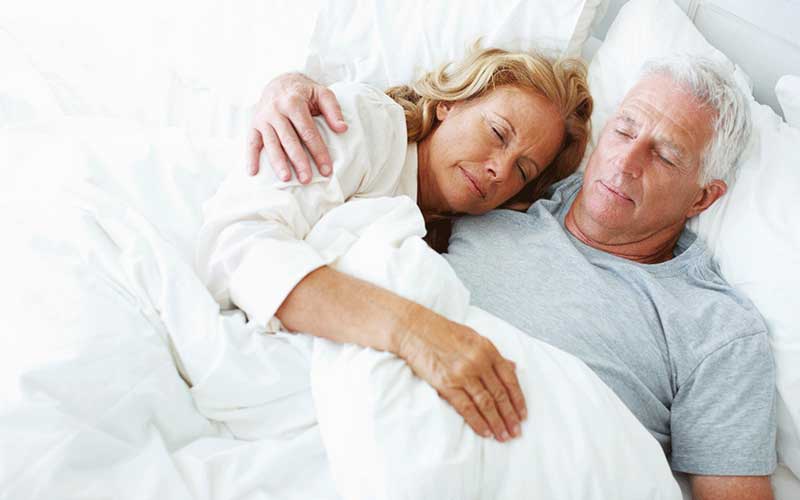
Older adults who are not getting enough sleep can be at a higher risk of accidents and falls. Changes to the bedroom environment that reduce the risk of accidents and make it easier to call for help can be made as people age. There are some steps that should be considered for a safer night’s sleep.
One of the most crucial ones is to have a phone by the bed to call for help. It’s better to keep a list of important phone numbers nearby and to keep your phone on the nightstand. If there is too much temptation to look at the bright screen or if a cell phone gets too many notifications during the night, be sure to put it on silent and avoid using it an hour before bed.
Also, it’s essential to make sure a light is within reach, so you don’t have to walk around in the dark. When trying to find the light switch, the risk of falling can be reduced by having a night light nearby. Don’t forget to reduce hazards in the bedroom. Don’t smoke in bed, and be careful when placing objects in the bedroom because they may become a trip hazard.
What causes sleep problems when you’re older?
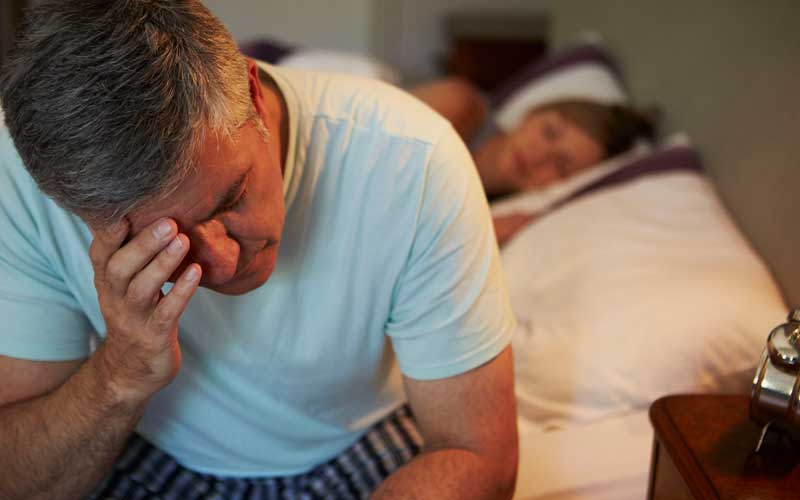
Understanding the effects of ageing on health is more important than ever to address older adults’ needs. In order to promote overall health in the elderly, it is necessary to review the relationship between ageing and sleep. You can tackle the issue and sleep better if you know what’s keeping you up. Here are the most common reasons:
Illnesses & conditions
You might have a medical condition that is interfering with your rest. For example, ailments such as arthritis, sleep apnea, and restless legs syndrome can make it hard to get a good night’s rest. If you have a condition or a sleep disorder that’s affecting your sleep quality, finding a treatment may help you get some shut-eye.
Medications
Some medications can keep you awake at night. Your doctor should be aware of all the medicines you take. They might suggest how much to take or when to take it. They might be able to change your medication to something that won’t affect your rest, so you are productive through the day.
Retirement
When you retire, you might end up having a lot more downtime and be less active during the day. That can disrupt your sleep-wake schedule. That’s why we highly recommend you to try to stay active by volunteering, hitting the gym, learning a new skill and spending time with friends and family.
Change
Major transitions in your life are more likely to occur as you get older. Change is scary, but we have to take it head-on. Stress can be caused by things like illness, financial problems or the death of a loved one, which can make it hard to sleep. You can find ways to manage stress by talking to your family or getting help from a counsellor.
How many hours of sleep do old people need?
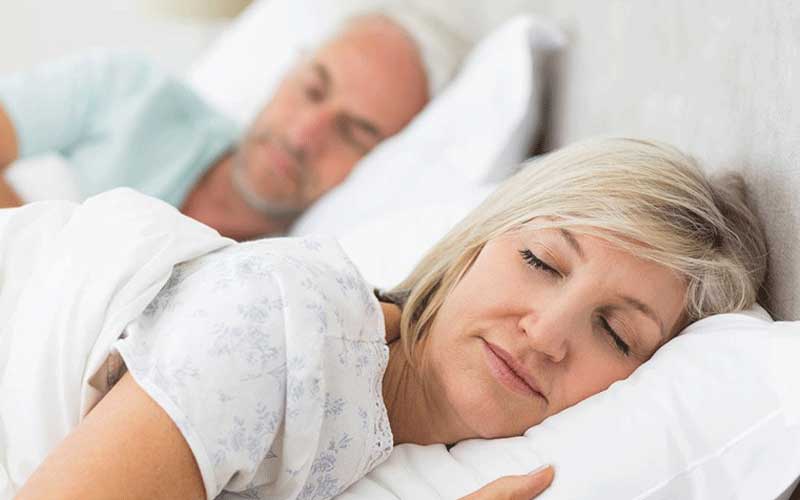
After the age of 60, changes affecting sleep do happen naturally. Changes in hormones and melatonin levels can cause us to take longer to fall asleep, sleep lighter, and wake more often during the night. As a result, we might find ourselves going to bed earlier and rising with the birds. According to studies, seniors still need seven to eight hours of sleep each night, which is pretty much the same as if you’re in your 20s.
Lack of sleep is something that should not be taken lightly. It impairs our immune systems, affects our daily activities, increases confusion, and may lead to falls and accidents. Therefore, it is as important as good health, good nutrition, regular exercise, and a positive attitude.
When to see a doctor about sleep problems?

When sleep problems start to interfere with your daily life, it’s time to see a doctor. Falling asleep behind the wheel and being tired consistently during the day are examples of how this can be. A doctor will be ready to discuss your concerns if you are honest with yourself and realize that many other people have the same concerns.
It is a good idea to get your symptoms caught early and figure out a plan with your doctor. The longer you wait to find a solution, the more damage your sleep schedule can do. Speaking to a professional is crucial to your health, which is why if you are experiencing sleep disturbances, you shouldn’t wait to get them checked.
Bottom line
To conclude our guide on ‘10 sleep tips for seniors’, we would like to say that insufficient rest in adults can lead to a higher risk of falls and accidents. This can be caused by multiple reasons such as medication, pain, menopause, etc.
As people age, it is helpful to make changes to your bedroom environment to reduce the risk of accidents and make it easier to call for help when needed. We hope we were able to answer the how and why, and now it’s our turn to hear from you if any questions regarding the subject were left unanswered. If you want to share some information, we would gladly hear about it in the comments below.

